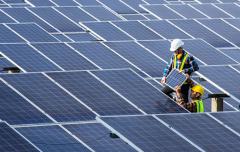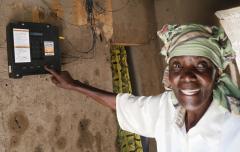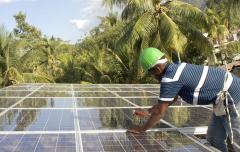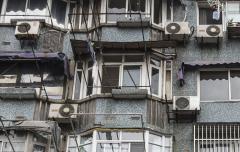A personal look at SDG7 through the eyes of SEforALL colleagues
We asked four colleagues to tell their personal stories about the impact of energy on their lives and their countries. Coming from Iceland, Eritrea, India and South Korea, their experiences may be different, but they are united by a common goal: access to affordable, reliable, sustainable and modern energy for all.
'Discussions about the last mile are not theoretical': Iceland's dramatic transition in just four decades
Iceland is a fascinating country. Until the mid-70s, it was classified as a developing country by UNDP. After the oil crisis in the early 70s, Iceland began to invest in renewable energy sources such as hydro and geothermal. After 40 years only, it became one of the most affluent countries in the world. Over 80 percent of the energy used is now green energy. The rest is oil and gas for the transport and fishing industries – but Iceland is in the process of phasing this out as well, with electric vehicles.
Now, Iceland's abundant green energy even supports energy-intensive industries like aluminium. Even flowers are grown locally in greenhouses. All houses are heated with geothermal energy. In a country near the Arctic circle, this is a significant advantage.
When I was a kid in the 60s, Iceland was dependent on oil imports. At home, we had many blackouts, and warm water was scarce. In retrospect, this has left me with few 'funny' memories, like around Christmas. When everyone was at home, my mother had to start cooking in the morning to ensure we had something warm to eat by the time Christmas rang in, at 6 pm. Even the showering times of us kids had to be planned well so that there was enough warm water for all.
With energy access, everything changes – daily life, the environment and the economy. The discussions about the "last mile" are not theoretical – access to clean energy is everything in every country, and coming from a country high up in the North with an extreme climate also made me feel more secure.
'Seoul was a grey city, the air smelled of coal, and even the snow turned black in winter': South Korea's path towards renewable energy
Do you know that following the Korean War, South Korea was one of the poorest countries in the world in the 50s? My father, born during the war period, told me that he had to collect firewood in the forest to stay warm in winter. When I was a child in the 80s, people still used coal and wood for heating and cooking, although mainly in rural areas. Stacks of coal were heaped up in front of houses, especially in poorer neighbourhoods. Seoul was a grey city, the air smelled of coal, and even the snow turned black in winter.
Then in the 90s, the government and people decided that this must change. With strong government support, households switched to cleaner fuels and technologies, many trees were planted, and the air quality improved.
South Korea remains one of the biggest coal importing countries and financiers of coal, alongside China and Japan, but it plans to phase out coal in the future. In April 2021, President Moon Jae-in announced to ban new public financial support for overseas coal-fired power investments. Currently, only 6 percent of the energy mix comes from renewables.
Asia has made a lot of progress in the last 60 years, but we should not forget that there are still many countries where people lack access to energy, and I am sad that North Korea is one of them.
'The lack of sustained access to clean cooking solutions is still a big issue for health, productivity, and the environment': India's clean cooking challenge
Growing up in Mumbai (New Bombay) in the 90s and early 2000s, I remember facing frequent power cuts, especially in summer. The local utility had to manage distribution between the surrounding industries and the households in the daytime. The blackouts could often last for hours, which meant no fans, no light, and if you lived on the top floors of an apartment building, it sometimes meant that you had to plan for the water supply being cut off. When we went to Kolkata for summer vacation, the power cuts were more frequent.
For college, I moved to New Raipur in the state of Chhattisgarh. The whole area was under development. The brand-new campus of my law school was located in a small village outside old Raipur city, with streets and other infrastructure still under construction. The buildings on the campus had access to the grid. We even had solar panels to heat water! But when I looked out of my dorm window in the evening, I could hardly see a single light in the village around. In the evenings, you could distinctly smell the smoke coming from the traditional cookstoves. While the grid did reach the surrounding villages, I wondered how many households could afford to keep the lights on at night. This only made me acutely aware of my privilege, having grown up in the city in a household with near 24/7 access to electricity and an LPG supply; one didn't have to care how many lights were switched on or where the firewood for the evening meal would come from.
Over the last 20 years, the situation in India has improved a lot. More and more people have access to electricity, most appliances are energy efficient, and power cuts are less frequent. However, the lack of sustained access to clean cooking solutions is still a big issue for health, productivity, and the environment. I hope this is given its due attention, and basic things like access to clean, modern and affordable energy supply ceases to be accessible to a privileged few.
'Changing a woman's life is a step to changing the course of the whole community': Eritrea's grid-based electricity challenges impact women
As a woman who grew up in a developing country around many tenacious and strong women, access to reliable energy has a particular importance to me, as the lack thereof was the elephant in the room that drained productivity, challenging the rudimentary aspects of modern living altogether.
Born and raised in Asmara, Eritrea – a country with an immense pool of natural resources for renewable energy –, being dependent on grid-based access to electricity was limiting on many ends. Although the physical infrastructure existed in the city, access was not reliable. This challenge was even magnified in the city's outskirts or far-out villages that did not have grid-based access.
As homemakers – and often as the sole breadwinners in the family – women are disproportionally affected by the lack of access to electricity and clean cooking. At a time when clean cooking alternatives and technologies are available, it is unacceptable for women to continue using unclean and inefficient means and suffer from adverse effects of indoor pollution and related health complications.
Women need access to clean, modern and efficient energy. Changing a woman's life is a step to changing the course of the whole community.








